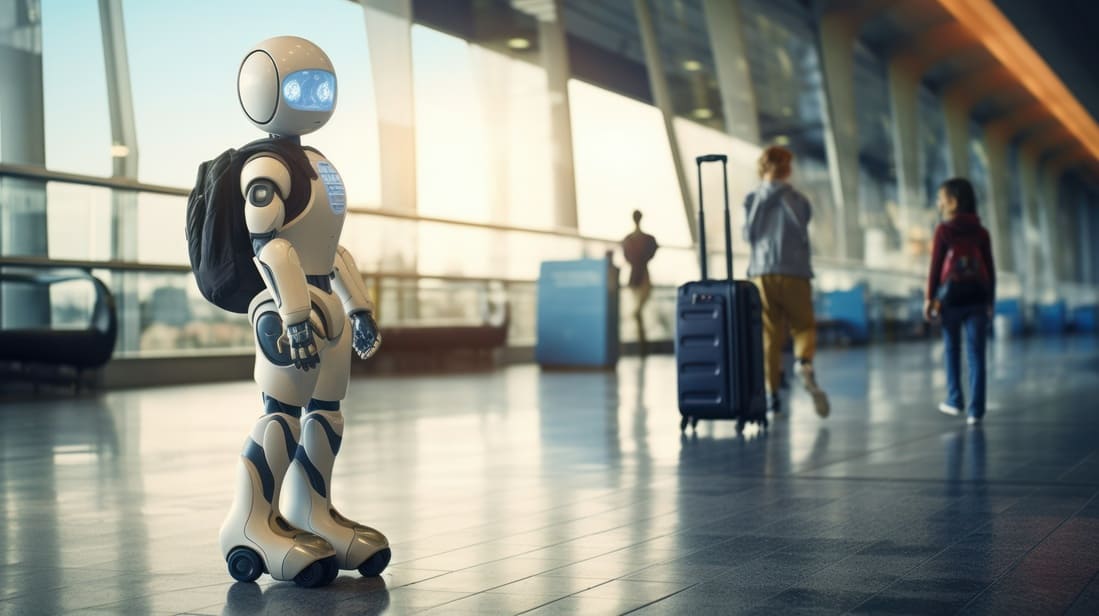
The Top Travel Tech Trends You Need to Follow in 2024
Another year is almost over, and as always, the travel tech industry continues to innovate and improve how we see the world. As we enter 2024, a range of breakthrough technologies are emerging that will change the way we travel forever. Let’s take a look at what we can expect in the coming year from the most significant travel tech trends of 2024.
1.Generative AI in Travel Planning
Generative AI, such as ChatGPT, has taken the world by storm in 2023. As advanced as these chatbots seem, we are only at the beginning of a wider shift to AI implementation. Next year, we expect it to transform travel planning by offering personalised itinerary suggestions, booking assistance, and travel tips. This technology leverages vast amounts of data to provide recommendations that align with individual preferences, making the planning process more fun and unique to each user.
Example: Imagine planning a trip to Italy and using an AI tool that suggests an itinerary based on your interests in history, cuisine, and outdoor activities, along with real-time weather and local events.
2. Interactive Maps and Augmented Reality
Advanced mapping technologies combined with Augmented Reality (AR) are redefining how travellers explore destinations. These interactive maps provide real-time data, satellite imagery, and immersive experiences that go beyond traditional navigation. We might see the introduction of this through the latest gadgets like Apple Vision Pro.
Example: Walking through the ruins of Rome with an AR-enabled device that overlays historical information and reimagines the ancient city in its former glory while giving you directions to all the must-see sights.
3. Blockchain for Secure Transactions
Blockchain technology is set to play a critical role in ensuring secure and transparent transactions in the travel industry. It offers decentralised solutions for booking flights and accommodations, reducing the risk of fraud and improving trust between travellers and service providers.
Example: Using a blockchain-based platform to book a hotel room where the transaction is recorded on a secure, immutable ledger, ensuring both the traveller and the hotel have a reliable record of the booking.
4. Smart Luggage with IoT Integration
High-tech suitcases and bags are starting to come with features like GPS tracking, built-in scales to prevent overweight fees, remote locking systems, and even USB charging ports. This technology not only provides peace of mind by keeping track of belongings but also adds convenience and efficiency to the travel experience.
Example: Using a smart suitcase that you can track through your smartphone, ensuring you always know where your luggage is, whether it’s on the plane, at the airport, or being delivered to your hotel room.
5. Virtual Reality for Remote Exploration
Virtual Reality (VR) is offering new ways to explore destinations from the comfort of home. This is especially relevant for inaccessible or remote locations, providing virtual tours that are both immersive and informative. Many thought leaders see this as an opportunity to reduce carbon emissions generated by travelling, but will it catch on?
Example: Wearing a VR headset to explore the Amazon rainforest, experiencing the sounds and sights as if you were there, which can be a useful tool for planning or for those unable to travel physically.
6. Sustainable Technology for Eco-Friendly Travel
Technology is being leveraged to support sustainable travel practices. From electric vehicles to eco-friendly accommodations, the industry is focusing on reducing its environmental footprint.
Example: Booking a stay at a smart hotel that uses IoT devices to optimise energy consumption, along with offering electric vehicle charging stations.
7. Biometric Technology for Streamlined Travel
Biometric technology is enhancing security and streamlining travel processes. Facial recognition, fingerprint scanning, and iris scanning are becoming more prevalent in airports and hotels, offering a seamless and more secure travel experience.
Example: Bypassing long lines at the airport using a facial recognition system that quickly verifies your identity and boarding information.
8. The Rise of Mobile Bookings and Personalisation
Mobile technology is playing a pivotal role in travel bookings and personalisation. With the majority of travel bookings now made on mobile devices, there's a growing trend towards personalised, on-the-go travel management.
Example: Using a mobile app to book a last-minute flight and hotel deal based on your location and previous travel preferences.
9. Autonomous Transportation in Travel
Autonomous or self-driving vehicles are set to enter the scene in 2024. This technology, encompassing everything from self-driving cars to autonomous taxi drones, offers a safer, more efficient, and potentially more eco-friendly way of travelling. It’s possible that next year, we begin to see this technology being widely used for airport transfers, city tours, and perhaps even long-distance travel.
Example: Imagine hailing a driverless taxi from the airport to your hotel or taking a self-driving tour bus that takes you through the scenic routes of a city, all programmed and navigated through advanced GPS and AI systems.
The travel industry in 2024 is no doubt going to look completely different to how it looks today, driven by technological innovation. These trends give us a look into the future, but if you haven’t already begun digitalising your travel company, there is no time like the present.
It’s never been easier to implement the latest digital technologies into your operations. Contact our sales team today for more information about how ANIXE can bring the future to you today.
sales@anixe.pl
.

